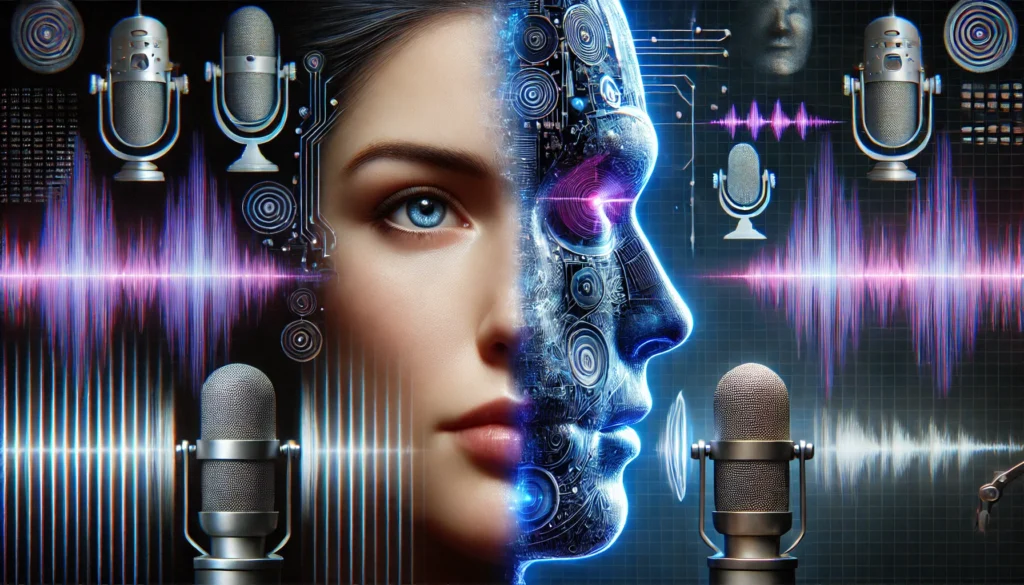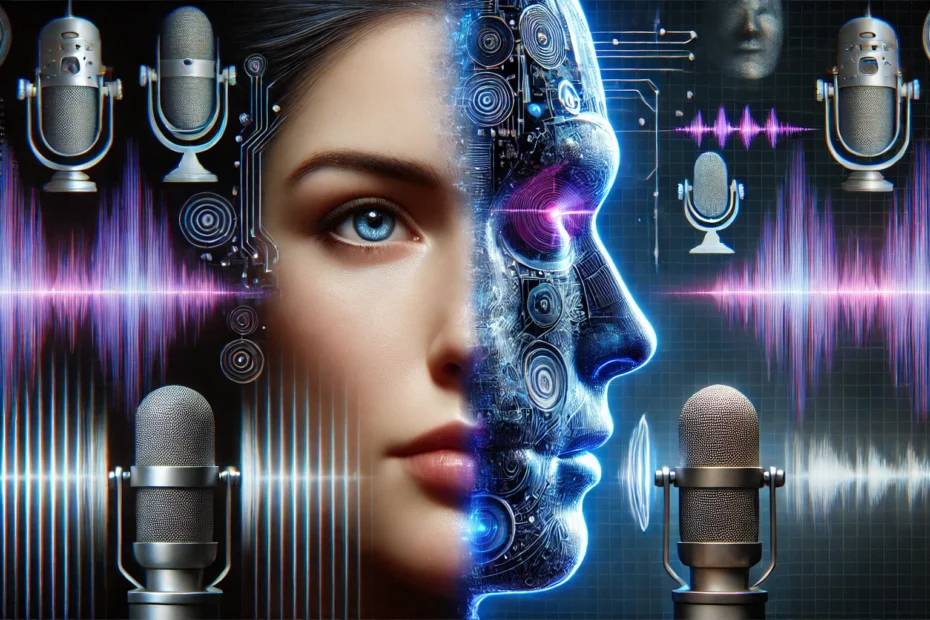
How AI Can Easily Clone Your Voice
When you think about how advanced AI technology has become, one of the most unsettling aspects is how AI can easily clone your voice.
- It’s fascinating yet terrifying. With just a few seconds of audio, AI voice models can generate a nearly perfect replica of your voice.
- This kind of technology, known as AI voice synthesis, is not only advancing rapidly but is becoming easier for anyone to use.
Let’s face it, we’ve all left voice recordings on social media or voicemail systems. But have you ever considered the risk that these recordings could be misused?
- Well, with AI voice technology evolving, your voice could be cloned without your consent.
- Here, I’ll walk you through five terrifying truths about how AI can easily clone your voice and the potential risks, from identity theft to AI-powered fraud.
Understanding how AI can easily clone your voice is crucial in protecting your digital voiceprint from unethical uses.
Truth 1 – AI Can Clone Your Voice with Just a Few Seconds of Audio
Imagine this: just 3 to 5 seconds of your voice, and an AI system could generate a voice so similar to yours that even your family might not be able to tell the difference.
- That’s the reality of today’s deep learning voice cloning technology.
- The risk here is enormous. Think about how often your voice is captured—whether through social media, videos, or phone calls.
Anyone with malicious intent could grab a tiny sample and use it to create a fraudulent voice replication.
- What are your thoughts about How AI Can Easily Clone Your Voice so far?
With such powerful AI voice manipulation, the technology can replicate not just the sound but the tone, pitch, and rhythm of your speech.
Here are some of the scary possibilities:
- Identity theft via AI: Cloned voices could be used to impersonate you in personal or financial matters.
- Audio cloning security threat: Hackers can bypass voiceprint authentication by mimicking your voice.
- AI-generated audio fraud: Scammers might use your cloned voice to trick others into thinking they’re speaking with you.
The implications are unsettling, and unfortunately, this isn’t some far-off sci-fi scenario. This technology is already here and being used in ways we hadn’t imagined.
Truth 2 – Deepfake Voices Can Fool Even Advanced Detection Systems
It’s frightening to realize how convincing AI-generated voices have become. We’re not talking about robotic voices anymore.
No, with today’s deep learning voice cloning technology, these voices can sound incredibly realistic.
What’s worse is that even some advanced detection systems have trouble telling the difference between a real voice and a fake one.
Here’s the scary part: with a cloned voice, scammers can perform targeted deepfake voice scams, tricking people into believing they’re talking to someone they trust.
It’s unsettling because this type of AI voice technology can bypass even the sharpest human ears and machines.
Let’s look at the risks:
- AI-powered voice fraud: Fraudsters are using cloned voices to impersonate family members, business partners, and even public figures to deceive people.
- Deepfake audio attacks: These attacks are becoming increasingly sophisticated, making it harder to detect and prevent fraud.
- Cybersecurity voice threats: Traditional cybersecurity measures are struggling to keep up with the rise of synthetic speech technology, leaving gaps in security systems.
I’ve read stories where companies were scammed out of millions because they thought they were talking to their CEO.
With the rise of voice cloning risks, it’s more important than ever to stay informed and cautious.
Truth 3 – Criminals Are Already Using AI-Generated Voices for Scams
Now, this one hits close to home because we’ve all seen it happen. AI-generated audio fraud isn’t just a future threat; it’s happening right now.
In fact, criminals are already using AI-powered voice fraud to pull off scams, and they’re getting away with it.
Let me paint a picture: imagine receiving a phone call from a family member asking for urgent help.
- Their voice sounds real, and they provide enough personal details to convince you. But in reality, it’s an AI-cloned voice.
- Isn’t it scary how AI can easily clone your voice?
This has already happened to victims, and the fraudulent voice replication has left them both emotionally and financially devastated.
Here’s how scammers are leveraging voice synthesis AI tools:
- Identity theft via AI: Scammers use cloned voices to impersonate family members in distress.
- Digital voiceprint theft: By stealing your voiceprint, criminals can exploit it to hack into secure systems, such as bank accounts.
- Voice replication ethics: The ethics surrounding this technology are still being debated, but its misuse is already causing real harm.
It’s unbelievable how quickly AI voice manipulation has moved from experimental technology to a tool for scams.
What scares me the most is that the voice cloning risks are becoming more widespread, and many people aren’t even aware of how vulnerable they are.
Truth 4 & 5 – Legal Protections and Voiceprint Security Risks
Now, let’s get into the more unsettling truths. The legal system simply isn’t prepared for how AI voice technology is being used today.
The laws surrounding voice replication ethics are still catching up, which means we’re at risk of falling victim to AI-generated audio fraud without much legal recourse.
On top of that, voice biometrics hacking is a growing threat. A lot of organizations, including banks, are starting to use voiceprint authentication.
But here’s the thing: AI-powered voice fraud can bypass these systems. With a cloned voice, attackers can access your accounts, and you might not even know it until it’s too late.
Key Risks:
- Voiceprint authentication vulnerability: AI can mimic voiceprints with alarming accuracy, allowing hackers to break into secure systems.
- Digital voiceprint theft: The rise of cybersecurity voice threats means that we need better protections for our voice data.
It’s a real concern, and it feels like we’re just now realizing how vulnerable our voices are.
The fact that AI can easily clone your voice adds another layer of risk to how we interact online.
FAQs about How AI Can Easily Clone Your Voice
Can AI really clone a voice?
Yes, AI can easily clone your voice with just a few seconds of audio. The deep learning voice cloning techniques have become so advanced that these cloned voices are nearly indistinguishable from the real thing.
How can I tell if a voice is fake or AI-generated?
It’s tough. The best way to spot a fake voice is to look for inconsistencies, but even that’s getting harder with today’s realistic voice imitation AI. Tools designed for AI audio forgery prevention can help, but they’re not foolproof.
Is AI voice cloning legal?
Right now, the laws vary by location, but generally, cloning someone’s voice without permission is unethical and can lead to legal trouble, especially in cases of fraudulent voice replication.
How can I protect my voice from being cloned?
Limiting the exposure of your voice data, such as by not sharing voice recordings publicly, can help. Additionally, being cautious about voice-based authentication systems can reduce your risk of identity theft via AI.
Conclusion to How AI Can Easily Clone Your Voice
So, where does this leave us? As you’ve seen, the fact that AI can easily clone your voice is a very real and scarypossibility.
- From AI-powered voice fraud to deepfake voice scams, the risks are growing.
- Cybersecurity voice threats are evolving, and unless we start taking action to protect ourselves, we could find ourselves facing serious consequences.
Here’s what I suggest: be mindful of where and how your voice is recorded, and keep an eye on the development of AI voice technology.
It’s only by staying informed that we can protect ourselves from the rising dangers of voice cloning risks.
THE END
